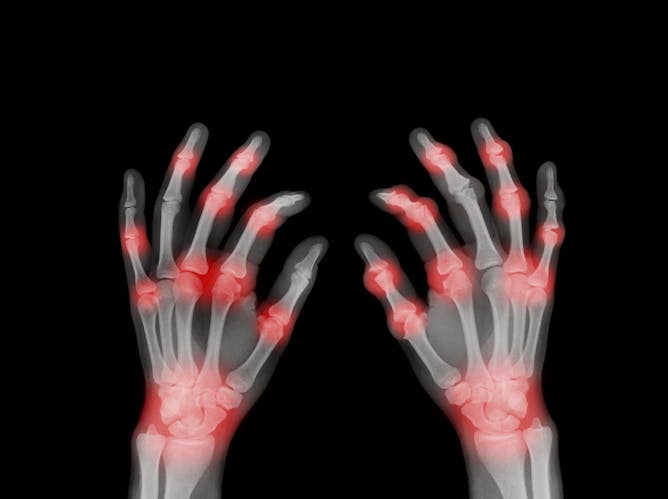|
|
|
|
With marijuana becoming legal in more states, people have begun to use cannabis for what are essentially therapeutic reasons – to help with sleep, anxiety or nausea, for example. A story today explores marijuana’s potential for treating chronic pain. Written by University of Washington pharmacologist Benjamin Land, the article explains how the two primary cannabinoids in marijuana plants – THC and CBD – affect the brain to reduce pain, and how they can be combined
with existing opioids for pain management. Land predicts marijuana’s “use in medicine will undoubtedly grow exponentially.”
One of the most widely read science articles this past week explains research that finds a link between the gut microbiome and rheumatoid arthritis. Immunology researcher Meagan Chriswell from the University of Colorado Anschutz Medical Campus writes about how she and her colleagues discovered a previously unknown species of intestinal bacteria that is present in people with rheumatoid arthritis.
The COP27 climate conference begins in Egypt next week, and one topic expected to take center stage is compensation from richer countries to poorer ones for the economic impacts of climate change. Bethany Tietjen, a research fellow in climate policy at Tufts University’s Fletcher School, explains the discussion around what’s called “loss and damage” and why it’s so contentious. “Negotiators know that the idea of payments for loss and damage has the potential to
lead to further discussions about financial compensation for historical injustices, such as slavery in the United States or colonial exploitation by European powers,” she writes.
Also in this week’s science news:
|

|
Martin La Monica
Director of Editorial Projects and Newsletters
|
|

The cannabis plant produces both THC – the psychoactive component in marijuana – and the compound commonly known as CBD, which does not lead to a ‘high.’
Jena Ardell/Moment via Getty Images
Benjamin Land, University of Washington
Studies suggest that marijuana and CBD use might help relieve chronic pain while also reducing a patient’s need for opioids.
|

Rheumatoid arthritis leads to painful joint inflammation, often in the hands and wrists.
Peter Dazeley/The Image Bank via Getty Images
Meagan Chriswell, University of Colorado Anschutz Medical Campus
A new species of bacteria that doesn’t normally live in the gut may trigger an immune response so strong that it spreads to the joints.
|

Extreme flooding in Pakistan in 2022 affected 33 million people.
Akram Shahid/AFP via Getty Images
Bethany Tietjen, Tufts University
That’s the big question at the upcoming UN Climate Change Conference, known as COP27, and it’s controversial. Here are some of the ideas being floated.
|
|
|

Christopher Dancy, Penn State
Many AI algorithms, like facial recognition software, have been shown to be discriminatory to people of color, especially those who are Black.
| |

Colin Pritchard, University of Washington
Multicancer early detection tests are among the priorities of the Biden administration’s Cancer Moonshot. The tests show promise, but questions remain about when and how to use them.
|

Rochelle H. Holm, University of Louisville
Public health officials monitor sewage in local communities to track COVID, polio, flu and more. But no one asks the people being monitored for their permission – raising some questions and concerns.
| |

Lucas Berenbrok, University of Pittsburgh Health Sciences; Marian Jarlenski, University of Pittsburgh Health Sciences
Some states already allow pharmacists to provide birth control to patients with a prescription. But FDA approval of an over-the-counter birth control pill could greatly expand access.
|

Andrew M. Southerland, University of Virginia
Auditory processing disorders and aphasia can make spoken speech difficult to produce and understand. But these challenges alone do not imply cognitive impairments.
| |

Stephanie Jenouvrier, Woods Hole Oceanographic Institution
Emperor penguins survive in a ‘Goldilocks zone’ between too much sea ice and too little. Climate change is having an impact.
|
|
|
|
|
-
Soyoung Oh, Tufts University
Many small island nations are struggling to protect their land from rising seas while also facing paralyzing debt.
-
Nicolás M. Morato, Purdue University
The chemical reaction that forms essential biomolecules like proteins and DNA normally doesn’t occur in the presence of water. Microdroplets provide a unique environment that make it possible.
-
Daniel Sperling, University of California, Davis; Lewis Fulton, University of California, Davis; Marshall Miller, University of California, Davis; Miguel Jaller, University of California, Davis
As California goes on regulating air pollution, other states often follow – including the Golden State’s ambitious goals for cleaning up emissions from trucking.
|
|
|
| | |
| | |
| |
| |
| |
|
|
|